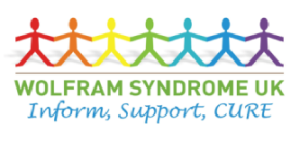Why should we have wolfram research?
It is crucial that we gain a complete understanding of the complexities of Wolfram Syndrome by performing rigorous research, which will serve as the platform





Wolfram syndrome, also known as DIDMOAD, is an inherited genetic disorder in most cases it is caused by a mutation of the WFS1 gene.
which represents (Diabetes Insipidus, Diabetes Mellitus, Optic Atrophy, and Deafness), is an inherited rare genetic disorder that affects multiple systems in the body. The disorder is named after Dr. Warren T. Wolfram, who first described the condition in 1938. It is estimated to affect one in 500,000 people worldwide. In most cases, Wolfram syndrome is caused by a mutation in the WFS1 gene. This gene plays a role in the proper functioning of cells throughout the body.
WS is difficult to diagnose with progressive and pleiotropic symptoms occurring at a variable rate in each child. Between ages 5 and 16 (age 6 median) children with WS typically first develop insulin-dependent diabetes. Most go on to next develop primary optic atrophy and vision impairment, half will develop sensorineural hearing loss, and nearly as many will develop diabetes insipidus. Unlike common types of diabetes, these children often go on to develop blindness, deafness and other neurologic disturbances. WS can also lead to psychological and behavioral issues, loss of senses of smell and taste, problems with balance and coordination, muscle spasms and seizures, urinary and gastrointestinal problems, and irregular breathing, reflecting the tissue distribution of the WS gene.
In September of 2021, Ghazal was diagnosed with Type 1 diabetes, a year after, Maria was also diagnosed with Type 1 diabetes. With time, more symptoms occured, such as Diabetes insipidus. This led the father to believe that his twin girls’ situation must be a genetic issue. Facing significant challenges navigating the right diagnosis, it mainly turned out that both of the twins have Wolfram syndrome, a rare genetic disorder, with no available drug therapies or cures and limited research and resources for rare diseases in Saudi Arabia. The father discovered wolfram syndrome global community which is missing in Saudi, so he decided to connect the Saudi patients and the GCC to the global wolfram community. Despite these challenges, with the help of international foundations focused on Wolfram syndrome and guidance from local genetics specialists and doctors, the father decided to create the Wolfram Heroes community. Inspired by the international journey in the disease, he made a commitment to advocate for Wolfram Syndrome and Rare Diseases in Saudi Arabia to help bring awareness and accelerate clinical trials and cure

To create a world where individuals affected by Wolfram syndrome and rare diseases in Saudi Arabia receive comprehensive support, and access to resources for a better quality of life.

Patient awareness & Advocacy, as well as accelerating clinical trials for Wolfram syndrome and advancing towards a cure in Saudi Arabia.










It is crucial that we gain a complete understanding of the complexities of Wolfram Syndrome by performing rigorous research, which will serve as the platform
Wolfram syndrome is a rare genetic disorder characterized by juvenile-onset diabetes mellitus, diabetes insipidus, optic nerve atrophy, hearing loss, and neurodegeneration. Although there are currently
Wolfram syndrome is an inherited condition that is typically associated with childhood-onset insulin-dependent diabetes mellitus and progressive optic atrophy. In addition, many people with Wolfram
We decided to carry the flag for Rare diseases and wolfram syndrome in Saudi Arabia and create a community to an umbrella for Rare diseases.